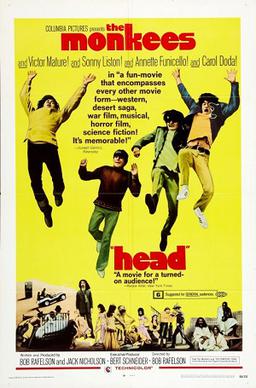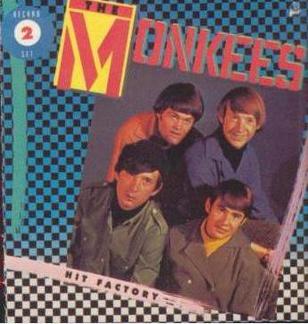
Robert Michael Nesmith was an American musician, songwriter, and actor. He was best known as a member of the Monkees and co-star of their TV series of the same name (1966–1968). His songwriting credits with the Monkees include "Mary, Mary", "The Girl I Knew Somewhere", "Tapioca Tundra", "Circle Sky" and "Listen to the Band". Additionally, his song "Different Drum" became a hit for Linda Ronstadt and the Stone Poneys.

The Monkees were an American pop rock band formed in Los Angeles in the mid-1960s. The band consisted of Micky Dolenz, Davy Jones, Michael Nesmith, and Peter Tork. Spurred by the success of the television show of the same name, the Monkees were one of the most successful bands of the late 1960s. With international hits, four chart-topping albums and three chart-topping songs, they sold more than 75 million records worldwide.
ESP most commonly refers to:

George Michael Dolenz Jr. is an American musician and actor. He was the drummer and one of two primary vocalists for the pop-rock band the Monkees, and a co-star of the TV series The Monkees (1966–1968).

Peter Halsten Thorkelson, better known by his stage name Peter Tork, was an American musician and actor. He was best known as the bass guitarist and keyboardist of the Monkees and co-star of the NBC television series of the same name (1966–68).
Fuse or FUSE may refer to:
Vessel(s) or The Vessel may refer to:

The Turtles are an American rock band formed in Los Angeles, California, in 1965 and best known for their 1967 hit song "Happy Together". They charted several other top 40 hits, including "It Ain't Me Babe" (1965), "You Baby" (1966), "She'd Rather Be With Me" (1967), "Elenore" (1968) and "You Showed Me" (1969).
Master or masters may refer to:
She or S.H.E. may refer to:

Blackadder II is the second series of the BBC sitcom Blackadder, written by Richard Curtis and Ben Elton, which aired from 9 January 1986 to 20 February 1986. The series is set in England during the reign of Queen Elizabeth I (1558–1603), and sees the principal character, Edmund, Lord Blackadder, as a Tudor courtier attempting to win the favour of the Queen while avoiding execution by decapitation, a fate that befell many of her suitors.

Head is a 1968 American satirical musical adventure film written and produced by Jack Nicholson and Bob Rafelson, directed by Rafelson, starring television rock group the Monkees and distributed by Columbia Pictures. A theatrical spin-off of the 1966–68 NBC television show and a swan song, it started production directly after completion of series production.
A boot is a type of footwear.
Beer is an alcoholic drink.

Hit Factory is a compilation album of songs by the Monkees, released by Pair Records in 1985 and licensed from Arista Records. The album was available as a two-record set or single cassette and sold surprisingly well the year following its release, after the Pleasant Valley Sunday MTV marathon of their television series in February 1986 reawakened interest in the Monkees.

"Last Train to Clarksville" is a song by American rock band the Monkees. It was released as the band's debut single on August 16, 1966, and was later included on the group's self-titled album, which was released on October 10, 1966. The song, written by Tommy Boyce and Bobby Hart, was recorded at RCA Victor Studio B in Hollywood on July 25, 1966, and was already on the Boss Radio "Hit Bounds" playlist on August 17, 1966. The song topped the Billboard Hot 100 for the week ending November 5, 1966. Lead vocals were performed by the Monkees' drummer, Micky Dolenz. "Last Train to Clarksville" was featured in seven episodes of the band's television series, the most for any Monkees song.

The Monkees' discography spans over 50 years, from the release of their first single, "Last Train to Clarksville" in August 1966 to their final live album The Mike and Micky Show in April 2020. Their discography is complicated due to the large volume of unique releases in many international markets, the release of many recordings not credited to the Monkees for lack of rights to the trademark, and the existence of many bootleg, promotional, and novelty recordings that are beyond the scope of this article.

"Porpoise Song" is a song written by Gerry Goffin and Carole King and performed by the Monkees as the theme song for their 1968 film Head and its accompanying soundtrack album. The single version contains an extended instrumental outro not included on the album version or in either of the song's appearances in Head. The song also appears on several Monkees greatest-hits albums.

The Monkees is an American television sitcom that first aired on NBC for two seasons, from September 12, 1966, to March 25, 1968. The series follows the adventures of four young men trying to make a name for themselves as a rock 'n roll band. The show introduced a number of innovative new-wave film techniques to series television and won two Emmy Awards in 1967, including Outstanding Comedy Series. The program ended in 1968 at the finish of its second season and has received a long afterlife through Saturday morning repeats and syndication, as well as overseas broadcasts.









